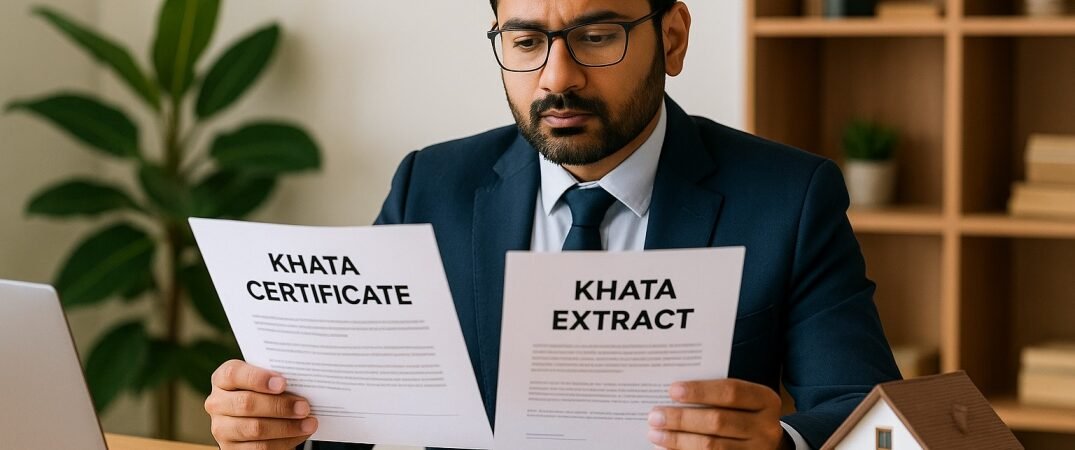🧠 Introduction: The Two Khatas You Didn’t Know You Needed
Imagine this:
You find a great property in Banashankari, and the seller proudly tells you, “We have the Khata.”
But when you ask for it, they hand over only a printout of property tax payment.
That’s not a Khata certificate, and definitely not a Khata extract either.
Unfortunately, most buyers in Karnataka don’t know what Khata documents actually are, and this can lead to rejected loans, failed registrations, or worse — investing in disputed or illegal properties.
In this blog, we’ll explain in simple language:
- What a Khata certificate is
- What a Khata extract is
- Why you need both
- How to get them
- And one real court case that shows why it’s risky to ignore them
📜 What Is a Khata Certificate?
A Khata Certificate is an official document issued by the GBA (Greater Bengaluru Authority, formerly BBMP), stating that a particular property is registered in the owner’s name in the municipal records and that property taxes are being paid.
It is primarily used for:
- Applying for building plan approval
- Getting a property electricity/water connection
- Applying for trade licenses
- Selling or transferring the property
The certificate will include:
- Name of the owner
- Property location and dimensions
- Property Identification Number (PID)
- Tax paid status
📄 What Is a Khata Extract?
A Khata Extract is a document that gives detailed information about a property from GBA’s assessment register.
It is commonly used to:
- Verify the ownership and legal status of a property
- Apply for home loans
- Confirm the property dimensions and usage type (residential, commercial, etc.)
The extract will contain:
- Owner’s name
- Plot number
- Survey number
- Type of property (vacant land/building)
- Area in sq. ft. or sq. m.
- Use of property (residential/commercial)
- Date of entry in GBA’s register
In short:
- Khata Certificate proves you are paying tax
- Khata Extract proves details of the property itself
📌 Why Do You Need Both?
| ✅ Khata Certificate | 🔍 Khata Extract |
|---|---|
| Proof that tax is paid | Details about the property itself |
| Needed for approvals | Needed for legal verification and loans |
| Issued on request | Issued from assessment records |
| One-page confirmation | Multi-page detailed document |
Without both, you may not be able to:
- Get building plan approval
- Apply for loans
- Legally register or sell the property
- Prove ownership to government authorities
🧾 Sample Case: Why Khata Certificate Alone Is Not Enough
In Basavaraj v. State of Karnataka (2017), the buyer submitted a Khata certificate as proof of ownership while applying for loan sanction. But when the Khata Extract was requested, it revealed:
- That the property was actually recorded under someone else’s name
- The dimensions mentioned were incorrect
- The property was under revenue land and not eligible for loan or registration
The court observed that a Khata Certificate alone is not ownership proof, and any decision must consider title documents, EC, and the Khata Extract together.
This case highlighted how sellers sometimes show only one document — but what really matters is full verification.
🏛️ Is Khata a Proof of Title?
No.
A Khata — whether certificate or extract — is not a title document. It only proves that the GBA is collecting tax from someone for a particular property.
If someone’s name is in the Khata, it does not automatically mean they are the legal owner. For legal title, you need:
- Registered sale deed
- Encumbrance certificate
- RTC (for plots)
- Mutation entries
- Conversion order (if applicable)
🧠 Where Do You Get These Documents?
| 📍 Document | 🏢 Issued By | 📝 How to Get It |
|---|---|---|
| Khata Certificate | GBA (formerly BBMP), Revenue Dept | Apply at GBA office or online via SAKALA portal with PID and receipt |
| Khata Extract | GBA/BDA based on layout jurisdiction | Apply at GBA office with copy of sale deed, PID, and tax receipt |
Some areas (like BDA layouts) will have Khata issued by BDA instead of GBA.
❗ Red Flags Buyers Should Watch For
Here’s a quick checklist to spot property fraud:
| ⚠️ Red Flag | ❌ Risk |
|---|---|
| Seller gives tax receipt only | Not a valid substitute for Khata certificate |
| Name mismatch in extract | Title mismatch — likely dispute or fraud |
| No PID number on certificate | Likely not issued by GBA |
| No Khata at all | Property is likely B-Khata or on revenue land |
| Fake Khata documents | Always verify originals and cross-check PID |
📞 Conclusion: Always Ask for Both Documents and Verify
Buying property in Bengaluru is more complex than just checking the sale deed.
A smart buyer always checks both:
- ✅ Khata Certificate (for tax compliance)
- ✅ Khata Extract (for legal property details)
And remember:
Neither of these is proof of title — only part of the due diligence puzzle.
To be truly safe, get all documents verified by a property law specialist.
📧 Email: ranjinijayaram@rjpropertylaw.com
🌐 Website: www.rjpropertylaw.com
📱 Call/WhatsApp: 8088417193
We offer Khata verification, title checks, and complete due diligence before you invest.
Let us help you protect your investment — before it’s too late.

